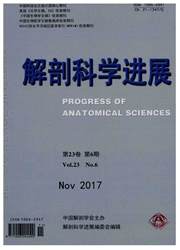

 中文摘要:
中文摘要:
目的研究黄体酮对Aβ1-42诱导的小胶质细胞激活和炎症因子的释放及其所致的海马神经元损伤的影响。方法通过Aβ1-42诱导体外培养的小胶质细胞(BV2细胞)活化,并予以外源性黄体酮处理。应用Aβ1-42诱导的BV2细胞的上清液处理海马神经元(HT22细胞)。应用ELISA法检测各组BV2细胞培养上清液中TNF-α、IL-1β的含量;CCK8法检测Aβ1-42-BV2小胶质细胞条件培养基对HT22海马神经元细胞的存活率。结果与对照组相比,Aβ1-42组的TNF-α、IL-1β的表达水平明显升高,且呈剂量依赖性。外源性黄体酮能降低Aβ1-42诱导的BV2细胞IL-1β、TNF-α的释放;Aβ1-42诱导BV2细胞炎症因子的释放,可导致HT22细胞死亡,而外源性黄体酮可通过抑制活化的胶质细胞炎性因子的释放而减轻神经元的死亡。结论黄体酮能够抑制Aβ1-42诱导的小胶质细胞的激活并减轻其导致的神经死亡。
 英文摘要:
英文摘要:
Objective To investigate the effect of Progesterone on the inflammatory responses of mice microglia cells(BV2 cells) treated with Aβ1-42 and the damage of mice hippocampal neurons(HT22 cells) induced by the supernatant. Methods Microglia cells(BV2) were stimulated with different concentrations of Aβ 1-42(final concentration 0, 1, 5, 10, 20, 40, 80μmol/L), and Progesterone(final concentration: 50μmol/L), respectively. The supernatants were used to treat cultured hippocampus neurons(HT22) for 48 h. The levels of tumor necrosis factor-α(TNF-α) and interleukin l-β(IL-1β) in the culture medium were assayed by ELISA. The viability of HT22 cells was tested by CCK8 kit. Results Compared with control group,the concentrations of TNF-α and IL-1β in Aβ1-42 treated group were significantly increased. The culture supernatant of BV2 cells treated with Aβ1-42 induced neuronal death. Progesterone inhibited the expression of TNF-α and IL-1β in the supernatant of BV2 cells treated with Aβ1-42 and attenuated neuronal damage. Conclusion Progesterone could inhibit the inflammatory responses in microglia treated by Aβ1-42, and attenuated neuronal damage induced by activated microglia.
 同期刊论文项目
同期刊论文项目
 同项目期刊论文
同项目期刊论文
 期刊信息
期刊信息
